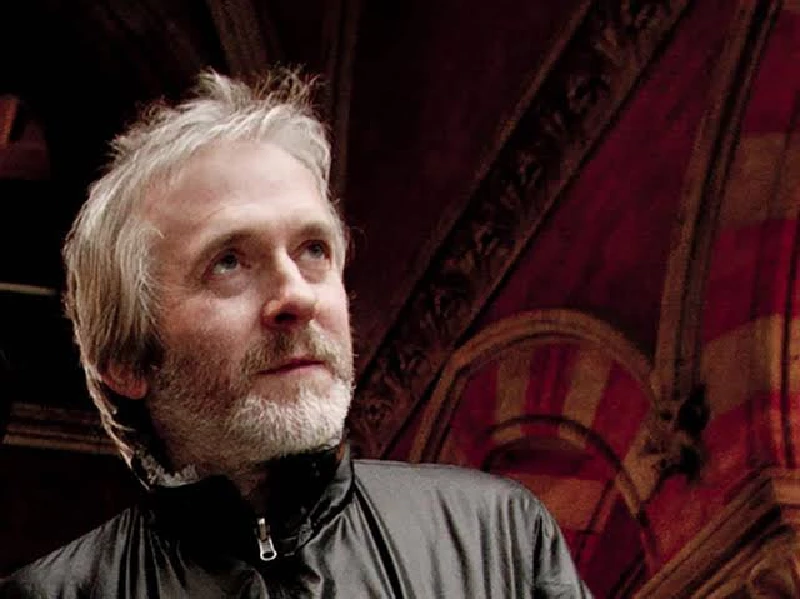Ian Button is one of Britain’s most prolific indie musicians. The former guitarist with both Thrashing Doves and Death in Vegas, he has largely focused on drumming in recent years and has played drums for artists as diverse as Wreckless Eric, Robert Rotifer, Darren Hayman, David Cronenbeg’s Wife, The Catenary Wires, Swansea Sound and European Sun. Folkestone-based Button also works as a producer, a masterer and fronts his own project Papernut Cambridge. He also is the unofficial head of busy umbrella label Gare Du Nord, who, as well as Papernut Cambridge’s five studio albums, have also released albums by acts such as Joss Cope, Extradition Order, Cult Figures, Ziggy Heroe and The White Papers. Button’s latest recent album ‘When the Magic Went Wrong: Tales of an Misfortunate Musician’ is something of a departure for him. Released under the moniker of Toni Tubna and the Stockholm Tuba Sect, it began out of an online joke between Button and his bandmates in The Catenary Wires when Button sent out emails under the persona of Toni Tubna, an imaginary magician. The joke mutated into a small book of short stories in which the permanently down-on-his luck and barely-on-the-right-side-of-the law Tubna gets himself into one scrape after the next while working the seaside towns and resorts of Britain. ‘When the Magic Went Wrong’ has now become an album, for which Button provides main vocals and music and his friend Scott Buckle, an art historian, has written the lyrics. Ian Button spoke to Pennyblackmsuic about ‘When the Magic Went Wrong’, and his work with Gare du Nord Records. PB: For a record that started out as an email joke between yourself and your bandmates, how did ’When the Magic Went Wrong’ generate into this book of short stories and then this album? IB: The jump from the emails into the book was the first stage before we recorded any music. I started sending these emails about my fictional past to the rest of the Catenary Wires (Laughs). I am guessing that would have been a year and a half ago, and eventually I had the idea to do a collection of short stories, So, the book came first and the next idea was to do a song. The first track that appeared, the title track of the book and album, wast like a theme song for the book. PB: Are you a massive fan of magic? IB: In a sort of ironic way (Laughs). I think I had a magic set when I was a kid, and I like the humour of it. The slightly grandiose concept of just trying to trick somebody is quite amusing o me. PB: Toni Tubna is a kind of Tommy Cooper figure because things wind up in disaster for him. IB: It is couched in the idea that his act goes wrong, but what is at the core of his character is that his life is going wrong at the same time. Some of the stories end in an on stage disaster, but lots of them are based around someone is trying to rip him off PB: He keeps portraying himself as a victim who keeps getting taken advantage of, but in some ways he is quite cunning and manipulative. IB: In a way he is quite Machiavellian. What he would love to have is more fame and that is what he gets him into the scrapes. His blind pursuit of that means that he will do anything to get there and he doesn’t realise that it is all hollow and a potential for disaster until it is too late. PB: Had you done much writing of fiction before? IB: No, I hadn’t done any. It doesn’t formulate with writing songs that much (Laughs). PB: Was it easy coming up with ideas for all the scrapes Toni gets himself into? IB: The first few stories were quite easy, but now it is getting a little bit more tricky because I am writing some more now. I have got some ideas for a second volume (Laughs). PB: Why did you decide not to put this out as a Papernut Cambridge album? IB: I might have done originally but it became a collaboration with Scott Buckle who wrote the lyrics. PB: How did Scott become involved? IB: Scott and I have been friends for a long time, and, many years ago he sent me a painting, which is the painting on the cover of the book and album. The painting is from 1942 and is of a guy in a top hat outside this fairground stall, and the reason he sent me it was that he said that it looked like me or a relative, and, of course, it is not at all. I have had this painting for years, not even in a frame, just sitting on the side in the kitchen, and that became the cover of the book. When I printed up the book, I sent it to Scott, who I hadn’t seen in years and said, “I want to send you this because I used that painting for it,” and he really liked the stories, and he said, “There has got to be an album to go with this surely,” and I hadn’t thought about that even, and so my reply back to him was “Do you fancy being involved in it? Do you fancy writing the words which will be inspired by the stories,” and he started to send me back lyrics or poems for each story, and that is how it began. It became a really fulfilling two wayprocess for both of us, because I was suggesting subtle changes to his lines, and he was suggesting stuff in the music which I would then do. It became a real 50/50 project which I haven’t been involved in for a long time. PB: You can read the stories on their own. Do you think that you can listen to the record without having read the stories? IB: I don’t know. I am inclined to say maybe that you can’t. I might be proved wrong about that. I would prefer people to read the book and then listen to the music. I think that they will get more out of it, but I am sure that there must be people who have listened to the music and not read the book. Perhaps I am the wrong person to ask (Laughs). PB: A few questions about the Gare Du Nord label. It was formed by yourself and Robert Rotifer and Ralegh Long. What was the blueprint for Gare du Nord? IB: It was initially really an excuse for us to release our three respective albums that we had ready back in 2013. Robert had his ‘The Cavalry Never Showed Up’ album, Ralegh had his first album ‘Hoverance’ and we all wanted to release them somehow. We had the idea of why don’t we join together and call it a label. I don’t think that we envisaged that anyone else would be involved with it in terms of any other friends being involved and releasing stuff. We thought that it would just be our three albums. In terms of a blueprint there wasn’t one apart from it being a no ties arrangement. PB: You are putting out now seven or eight albums a year. How did it grow from these three records? IB: It was just about connections between friends and related projects really. All the three of us were busy in other things as well, and we would invite other friends and projects that we might be involved in some way. It just seemed to grow like that. We then started to be contacted by people we didn’t know, who had seen the label and thought that it might fit. PB: What are you looking for when you are putting out a record on Gare du Nord? IB: I don’t think we have a policy or a target that we are looking for. I often describe it as being an open door to a like-minded artist. I guess that is the best way to describe it. The label comes from a collected group of people, as supposed o a musical identity. PB: Do you find yourself turning many people down? IB: One of the things that I have to do when people get in touch is explain how it doesn’t work like a traditional label and how the label doesn’t get any money out of the release, but at the same time on the other side of that coin there are lots of things which the label can’t do for the artist that bigger or more commercially-minded labels can do. It means a lot of work and a lot of commitment from the artist because Gare Du Nord can’t finance the release or pay for pressings. We can, however, help out with the artwork or doing the mastering in-house i.e. by me which means that they wouldn’t have to pay for that. We also don’t have to worry about a release schedule, as the bands dictate that, and a lot of our releases come out in quick succession . PB: Thank you.
Play in YouTube:-
intro
Papernut Cambridge frontman Ian Button speaks to John Clarkson about ‘When the Magic Went Wrong’, his new collection of short stories and album about a down-on-his-luck magician, which he has recorded under the moniker of Toni Tubna and the Stockholm Tuba Sect, and his work with Gare Du Nord Records.
most viewed articles
current edition
Carl Ewens - David Bowie 1964 to 1982 On Track: Every Album, Every SongSimian Life - Interview
the black watch - Interview
John McKay - Interview
Editorial - July 2025
Billie Eilish - O2 Arena, London, 10/7/2025
Armory Show - Interview with Richard Jobson
Hothouse Flowers - Photoscapes
Bathers - Photoscapes 2
Cleo Laine - 1927-2025
previous editions
Trudie Myerscough-Harris - InterviewBoomtown Rats - Ten Songs That Made Me Love....
Blues and Gospel Train - Manchester, 7th May 1964
Pixies - Ten Songs That Made Me Love...
Fall - Hex Enduction Hour
Heavenly - P.U.N.K. Girl EP
Sam Brown - Interview Part 2
Place to Bury Strangers - Interview
Miscellaneous - Charity Appeal
Doris Brendel - Interview
most viewed reviews
current edition
Sick Man of Europe - The Sick Man of EuropeAmy Macdonald - Is This What You've Been Waiting For?
Phew, Erika Kobayashi,, Dieter Moebius - Radium Girls
Alice Cooper - The Revenge of Alice Cooper
Blueboy - 2
Lucy Spraggan - Other Sides of the Moon
Bush - I Beat Loneliness
Davey Woodward - Mumbo in the Jumbo
Philip Jeays - Victoria
Lapsley - I'm a Hurricane, I'm a Woman In Love
related articles |
|
Papernut Cambridge: Interview (2014 |

|
| Ben Howarth chats to Death In Vegas and Rotifer member Ian Button about his band Papernut Cambridge's second solo album, 'There's No Underground' |
Pennyblackmusic Regular Contributors
Adrian Janes
Amanda J. Window
Andrew Twambley
Anthony Dhanendran
Benjamin Howarth
Cila Warncke
Daniel Cressey
Darren Aston
Dastardly
Dave Goodwin
Denzil Watson
Dominic B. Simpson
Eoghan Lyng
Fiona Hutchings
Harry Sherriff
Helen Tipping
Jamie Rowland
John Clarkson
Julie Cruickshank
Kimberly Bright
Lisa Torem
Maarten Schiethart
